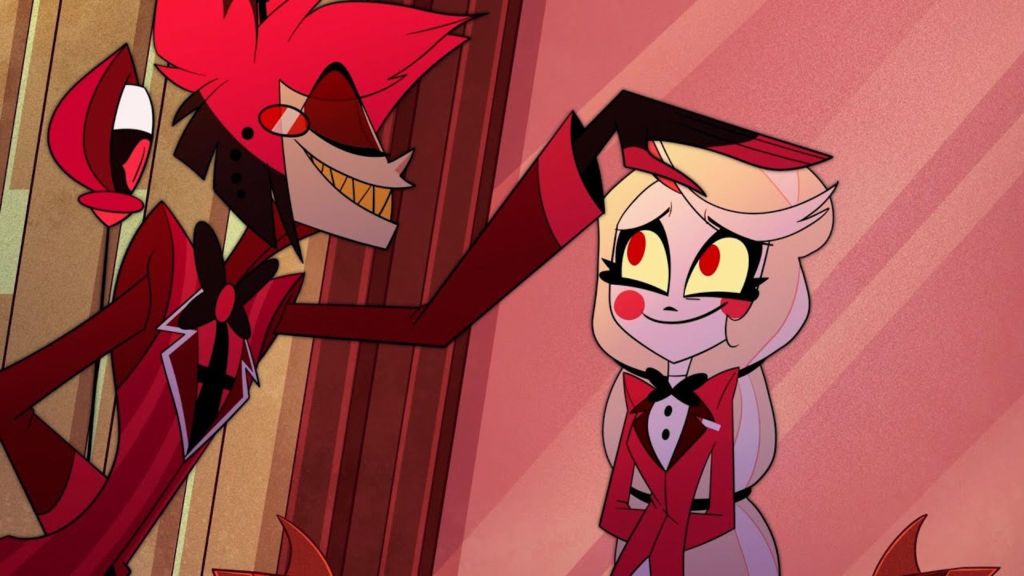Articles
Hazbin Hotel Star on THAT Finale Twist. “That’s What Season 3 is About.” [Exclusive]

WARNING! This article contains spoilers for the Season 2 finale of Hazbin Hotel.
The final moments of Season 2 of Hazbin Hotel opened the door for a shakeup to the established order of Hell, and, more personally, a massive dose of thrilling ambiguity for fans of the Radio Demon, Alastor. After spending the entirety of the second season sowing seeds of discord between the Vees (all while tied to a chair and never lifting a finger) and strategic maneuvering, Alastor finally executed the last stage of his well-laid plan: gaining true freedom from Rosie, the Overlord who owned his soul since before he even died. This calculated move leaves the Radio Demon completely free to do as he pleases in Hell for the first time ever. The question—what will a truly untethered Alastor do next?—is the ultimate unknown factor heading into the next chapter of the Prime Video hit.
In an exclusive interview, Amir Talai, the voice behind Alastor, acknowledged the significance of the finale’s twist. While he couldn’t speak about any of the tightly guarded secrets in store for Season 3, Talai discussed Alastor’s newfound freedom and how that relates to his complex relationship with Charlie Morningstar, the Princess of Hell. When asked directly about what comes next now that Alastor’s chains are broken, Talai offered a confident and cheeky response fitting of the Radio Demon himself: “I know exactly what you can expect. And that’s, that’s what Season 3 is about.”
Is Alastor’s Connection to Charlie Stronger Than His Unknown Goals?

Alastor’s entire essence boils down to a single question: Is he an unpredictable savior or an irredeemable demon through and through? His actions are usually contradictory and confusing, creating an interesting tension for both the audience and, as Talai reported, the actor himself. A perfect example of Alastor’s unpredictability is in Season 2 when he makes a binding deal with Vox to offer himself up as a prisoner with one important and non-negotiable caveat: “You are not to lay a hand on Charlie Morningstar.” Is this a protective instinct or merely a calculated ploy, knowing that Vox’s ego will ultimately be his undoing?
“The idea that Alastor… how do I answer this?” Talai asked, carefully navigating the line between actor insight and spoiler. “I think that villains, or characters of all kinds, often have ulterior motives. But it’s really interesting to imagine that they have an ulterior motive that completely subsumes the fact that they’re a person, right?”
For Alastor to be interesting, he must be capable of forming connections, even if those connections are inconvenient or counter-productive to his larger, shadowy plans. Talai admits that writing a character who just uses everyone on paper is simple, but the performance has to capture the potential for something more.
“I think that you can go into it and say, ‘Oh, I’m going to use Rosie. I’m going to use Vox. I’m going to use Charlie.’ That’s all well and good on paper. But then, when you get down to it, these are people, and you’re a person. And if you’re incapable of forming connections with other people, you’re not a very interesting character.”
This internal tug-of-war forms the foundation of the mystery that Season 3 has to address. “[Alastor] really does seem to care about Charlie. So how much of that is a put-on? Could any of it be real? And if so, how much?” The answer to Talai’s hypothetical question dictates everything. Could this kernel of genuine affection for Charlie be strong enough to actually get in the way of whatever he has planned? Or, will his larger goals mean that Charlie has to pay some terrible price? “And how is that going to impact him and her? And I think that’s one of the really interesting things for Alastor to deal with and for the audience to deal with, with respect to Alastor.”
Alastor’s Animosity Towards Lucifer Hints at a Much Larger and More Complicated Plan

The dynamic between Alastor and Charlie is complicated further thanks to her father, Lucifer Morningstar. The King of Hell views Alastor with immediate disdain and suspicion from the moment the two meet in the first season, a sentiment which Alastor reciprocates with one of his trademark grins. This strange rivalry, according to Talai, is part of a deliberate and tense plot point to come.
This conflict—a literal turf war over who gets to have Charlie’s trust and attention—is equal parts comedic relief and serious dramatic stakes. Lucifer views Alastor as a pest influencing his daughter and hanging around the hotel without purpose, while Alastor seems to genuinely enjoy poking the all-powerful fallen angel.
Talai noted that the dynamic between Lucifer and Alastor isn’t just a running gag, but raises questions not just about the source of their rivalry, but about Alastor’s ultimate motivation. “It’s great. I also like that it becomes a question for the audience as well—’ why is [Alastor] doing that?’” Talai said. “Is there something personal with Lucifer, or is there a larger goal behind getting close to Charlie? I love seeing people guess about that online.”
By securing his freedom from Rosie, Alastor is now in the perfect position to enact the next part of whatever “larger goal” he has been hinting at all along. His ability to challenge Lucifer’s authority and his confusing protectiveness towards Charlie are pieces of a puzzle that only he holds the final image of. Whether Alastor’s path to absolute power runs directly through Charlie’s heart or leads him to sacrifice her for his own ambition is a mystery that will define the upcoming seasons. Whatever happens, Talai is confident that the answers will be worth the wait, confirming the finale twist was merely the opening act.
What do you think? Leave a comment below and join the conversation now in the ComicBook Forum!
The post Hazbin Hotel Star on THAT Finale Twist. “That’s What Season 3 is About.” [Exclusive] appeared first on ComicBook.com.



